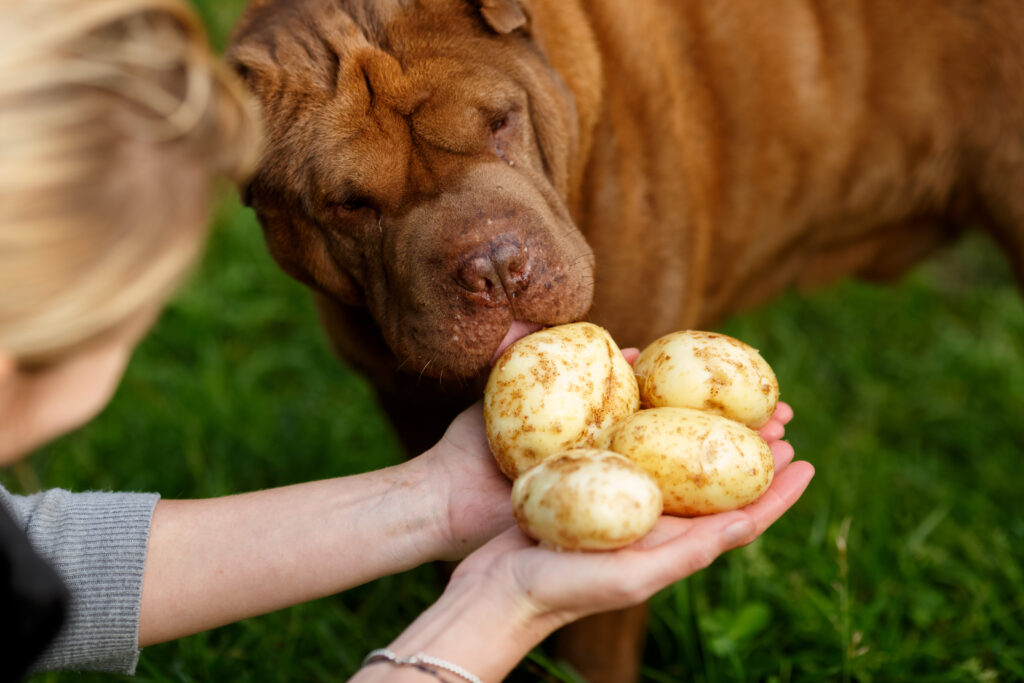Potatoes are a common household vegetable, loved by many, and it turns out our canine companions are often fans as well! But is it safe to feed your dog potatoes, or could they be a health risk? While this question doesn’t have a straightforward answer, we are here to break it all down. We’ll explore the ins and outs of feeding potatoes to your dog, highlighting the conditions that make them a safe treat for your pet. Keep reading for essential details about potatoes and how they can be safely included in your dog’s diet.
How Potatoes Can Be Beneficial to Your Dog’s Health
Potatoes are packed with vital nutrients, boasting vitamins such as C and B6 and minerals like iron and magnesium. These components benefit your dog’s immune and nervous systems and contribute positively to their overall health.
You might notice dog foods in the market that include potatoes as one of the ingredients. However, if you decide to feed your dog potatoes at home, it’s important to make sure they are prepared correctly and be aware of certain substances in them that could be harmful. These substances are solanine and oxalates.
The Risks of Raw Potatoes: Solanine and Oxalates
Solanine and oxalates occur naturally in potatoes, but their consumption can spell trouble for a dog. It’s necessary to be aware of these components and take measures to reduce their toxicity before feeding potatoes to your pet.
Solanine
What it is: Solanine is a glycoalkaloid poison found in the nightshade family of plants, like potatoes (particularly in the green parts and sprouts), tomatoes, and eggplants.
How it affects dogs: Solanine can be toxic to dogs. Cooking potatoes reduces their solanine levels, but the high amounts in raw potatoes can be dangerous. It can impact the nervous system and cause gastrointestinal issues.
Symptoms of solanine toxicity: Symptoms of solanine poisoning in dogs include nausea, diarrhea, vomiting, cramps, dizziness, and, in severe cases, neurological problems. Any signs of these symptoms should be addressed by a veterinarian immediately.
Oxalates
What it is: Oxalates, or oxalic acid, are compounds in many plants, including potatoes. Oxalates, in particular, can be found in potato skins. They are also present in vegetables like spinach and beets.
How it affects dogs: Excessive consumption of oxalates can lead to health issues in dogs, mainly affecting their kidneys and potentially causing the development of urinary crystals or kidney stones.
Symptoms of oxalate toxicity: Symptoms of high oxalate toxicity in dogs include lethargy, weakness, vomiting, and changes in urination patterns. Contact your vet immediately if you notice any of these problems in your dog.
Tips for Safely Preparing Potatoes for Your Dog
Below are some guidelines on how to prepare potatoes in a dog-friendly way so your pet can reap the benefits without any harmful effects.
How to Prepare Potatoes
Potatoes should be well-rinsed and thoroughly cooked but not seasoned. Avoid adding toxic ingredients to dogs, such as salt, garlic, and onion powder.
Mashed Potatoes
Plain, unseasoned mashed potatoes are another safe option for your dog. That means no butter or margarine! Remember to exclude harmful seasonings and excessive salt.
Baked Potatoes
Ensure baked potatoes are peeled, fully cooked, and butter- and seasoning-free. Be cautious of any added flavors during cooking.
Things to Remember Before Giving Potatoes to Your Dog
Some dogs, especially those with chronic health conditions like diabetes, may face complications from eating potatoes due to their potential to increase blood sugar levels.
Additionally, be mindful of the risks of solanine and oxalates. Even cooked potatoes, if consumed excessively, can lead to poisoning. Monitor the amount and frequency of potato treats for your dog. While potato poisoning is rare, it’s always better to be cautious!
Potatoes are a popular food among humans, and dogs love them too. When potatoes are given in moderation and prepared correctly (cooked, unbuttered, and unseasoned), they can be a safe and enjoyable treat for your pup. However, it’s essential to always be aware of the compounds contained in potatoes to avoid health risks. If you’re uncertain about what’s safe for your pet or if they show unusual symptoms after eating something new, consulting with a veterinarian is your best course of action.
Contact Us for More Pet Nutrition Information
For further advice on your dog’s nutrition, including questions about potatoes or other foods, don’t hesitate to reach out to Best Friends Animal Hospital in Manchester at (603) 625-2378. We’re here to help your pet stay happy and healthy!





